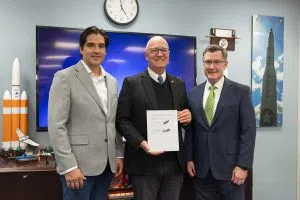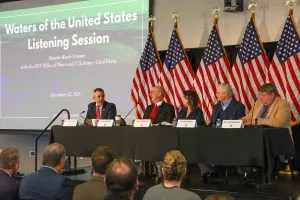
LOS ANGELES, CALIFORNIA – OCTOBER 01: An American Airlines plane takes off from Los Angeles International Airport (LAX) on October 1, 2020 in Los Angeles, California. United Airlines and American Airlines are set to start furloughing 32,000 employees today after negotiations for a new coronavirus aid package failed in Washington. (Photo by Mario Tama/Getty Images)
(John Hult – North Dakota Monitor) – The U.S. Department of Energy has granted a conditional loan guarantee worth $1.46 billion to Gevo, the Colorado company that aims to build the nation’s first ethanol-to-jet-fuel facility near Lake Preston in South Dakota.
A news release from the department’s Loan Programs Office said the loan guarantee “supports the Biden-Harris administration’s goal” of producing 3 billion gallons of sustainable aviation fuel nationwide by 2030, and 35 billion gallons a year by 2050. The conditional commitment indicates an intent to finance the project after a federal environmental review, as well as other technical, legal, environmental, commercial and financial conditions.
The Gevo project is called “Net-Zero 1.” The facility would include a plant to produce ethanol exclusively for use in aviation fuel, using corn from farmers contracted to produce their crops using a set of climate-friendly practices, such as cover cropping and no-till agriculture.
That ethanol would be transformed to jet fuel in a separate facility at the same site. Gevo also intends to build a wind farm to help power the operations, and a facility called Dakota Renewable Hydrogen to produce hydrogen for use in fuel production.
The U.S. currently produces about 30 million gallons of low-emission jet fuel each year, the Energy Department release says. Net-Zero 1 could produce twice that amount annually.
The Gevo fuel would reduce annual carbon emissions by 600,000 metric tons a year, according to the department. The facilities would also produce 1.3 billion pounds of animal feed and 30 million gallons of corn oil per year as byproducts of the fuel production process.
Under the Biden administration, the loan guarantee program requires applicants to have a “Community Benefits Plan” that would “meaningfully engage” with community and labor groups “to create good-paying jobs and improve the well-being of residents and workers.”
“The Lake Preston facility is located near disadvantaged communities that face high rates of expected population loss,” the release says.
The Energy Department announced its loan guarantee for Gevo on Wednesday afternoon. It also announced a $1.44 billion loan guarantee for a company called Montana Renewables on Wednesday, meant to support a project that aims to produce sustainable aviation fuel using vegetable oil.
In its own news release on the loan guarantee, Gevo pointed to a report prepared for it by Charles River Associates that says the Lake Preston project would support the local agricultural operations and the businesses supported by them, create 1,300 jobs during construction and 100 permanent jobs. The report put Net-Zero 1’s annual economic impact at “over $100 million.”
“We expect that NZ1 will kickstart new growth in the economy, create jobs, and present additional opportunities for the agricultural community in the region around Lake Preston, across South Dakota, and even reaching other states,” Gevo Senior Vice President of Public Affairs Lindsay Fitzgerald said in the press release.
Gevo is the same company that is working to purchase the Red Trail Energy ethanol plant in western North Dakota.
South Dakota support, opposition
Gevo’s plan has drawn support and criticism in South Dakota. Gov. Kristi Noem called it the largest economic development project in state history during an address to the Legislature in 2023, and Lt. Gov. Larry Rhoden appeared at the project’s groundbreaking in 2022.
Noem’s son-in-law, Kyle Peters, is a registered lobbyist for Gevo.
Noem spokesman Ian Fury did not immediately respond to a request for comment on the loan announcement Thursday.
But Net-Zero 1’s future is also dependent on the controversial Summit Carbon Solutions pipeline project. Summit’s proposed pipeline would pump carbon produced by Midwestern ethanol plants, including Gevo’s proposed plant, to a site in North Dakota for underground sequestration. The pipeline has been denied a permit by the South Dakota Public Utilities Commission, but Summit has said it plans to reapply.
Some landowners are vehemently opposed to the project, and have lobbied lawmakers for legislation to prevent Summit from using eminent domain to build beneath their property. Some county commissions, meanwhile, have passed restrictions on pipeline projects that Summit argues would make the project all but impossible to complete.
Lawmakers in South Dakota passed a bill dubbed the “landowner bill of rights,” which was signed into law by Gov. Noem. The law would ensure annual payments from carbon pipeline companies for property tax relief and outlines carbon pipeline companies’ responsibilities to landowners, including minimum depth requirements and the protection of agricultural drain tiling.
Anti-pipeline activists successfully petitioned the law onto the Nov. 5 ballot, however, arguing that it would erode local control.
Gevo donated $167,000 to support efforts to convince voters to support the pipeline law at the ballot box in November.
Eleven of the state legislative incumbents who lost their bid for a slot on the general election ballot in the June primary fell to opponents who campaigned on an anti-pipeline platform.
Gevo’s leadership has repeatedly spoken of the Summit pipeline as a critical part of its business plan. The potential profitability of Gevo’s jet fuel is tied in part to federal tax credits for carbon abatement, meant to incentivize the reduction of carbon emissions that contribute to climate change, as well as incentives for low-carbon fuels in states like California. Gevo would need to sequester the carbon produced by its facilities to minimize the carbon footprint of its jet fuel.
CEO Patrick Gruber has said that the Net-Zero 1 project might not be feasible in South Dakota without Summit’s pipeline.
Federal loan linked to SD location
Gruber told South Dakota Searchlight at the time he believes the Summit project will be completed, but that the company “would have to consider” moving its operations to North Dakota “if there is no hope” for a carbon pipeline in South Dakota.
During an investor call Thursday morning, Gruber was asked about another potential political issue, in this case on the federal level. One of the investors asked if the company’s loan would remain viable in the event Republican Donald Trump is elected president in November. Trump has signaled plans to undo many of President Biden’s climate change policies.
“The conditional commitment survives administrations,” Gruber said, referring to the loan guarantee.
The loan guarantee is tied to the South Dakota site, Gruber told South Dakota Searchlight in an email. The funds would not be used for the facility in North Dakota.
But Gruber also reiterated his confidence in the future of the Summit pipeline.
“It’s hard to imagine a scenario where a pipeline in SD doesn’t eventually get built,” he said.
The news of the North Dakota acquisition and the federal loan have boosted the company’s stock price. Until recently, Gevo was at risk of being delisted from the Nasdaq stock exchange for failure to maintain a share price of $1 or higher for five consecutive days. Its stock price climbed over that $1 mark shortly after the North Dakota announcement. Its share price opened trading above $3 on Thursday morning.









